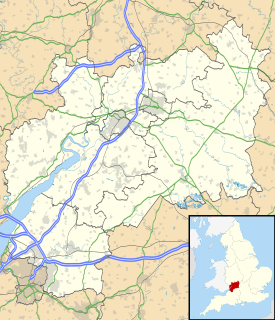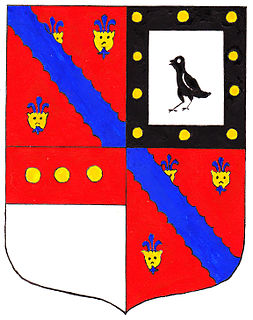
Gloucestershire is a county in South West England. The county comprises part of the Cotswold Hills, part of the flat fertile valley of the River Severn, and the entire Forest of Dean.

Alveston is a village, civil parish and former manor in South Gloucestershire, England, inhabited in 2014 by about 3000 people. The village lies 1 mile (1.6 km) south of Thornbury and 10 miles (16 km) north of Bristol. Alveston is twinned with Courville sur Eure, France. The civil parish also includes the villages of Rudgeway and Earthcott.

Little Sodbury is an English village in South Gloucestershire, located between Chipping Sodbury, to the West, Old Sodbury to the South, Badminton, and the A46 road to the East and Horton and Hawkesbury Upton, to the north.

Stonehouse is a town in the Stroud District of Gloucestershire in southwestern England.

The Stonehouse Court is a Grade II listed manor house in Stonehouse, Gloucestershire, England which is now a hotel. It is located next to St Cyr's Church and the Stroudwater Canal.
This is a list of Sheriffs and High Sheriffs of Gloucestershire, who should not be confused with the sheriffs of the City of Gloucester.

Umberleigh is a former large manor within the historic hundred of (North) Tawton, but today a small village in North Devon in England. It used to be an ecclesiastical parish, but following the building of the church at Atherington it became a part of that parish. It forms however a part of the civil parish of Chittlehampton, which is mostly located on the east side of the River Taw.
Sir George Nayler, KH FRS was a long-serving officer of arms at the College of Arms in London.

Stonehouse railway station was a station in Stonehouse, England, on the Bristol and Gloucester Railway between Haresfield and Frocester.
Nailsworth railway station served the town of Nailsworth in Gloucestershire, England and was the terminus of the 9.3km-long Stonehouse and Nailsworth Railway, later part of the Midland Railway.
Ryeford railway station served the villages of Ryeford, Kings Stanley and Leonard Stanley in Gloucestershire, England. It was on the 9.3km-long Stonehouse and Nailsworth Railway, later part of the Midland Railway.

Dudbridge railway station served the Stroud suburb of Dudbridge and the village of Selsley, little more than 1 mile (1.6 km) from Stroud, in Gloucestershire, England. The station was on the 5 3⁄4 miles (9.3 km) long Stonehouse and Nailsworth Railway, later part of the Midland Railway.
Woodchester railway station served the villages of Woodchester and Amberley in Gloucestershire, England. It was on the 9.3km-long Stonehouse and Nailsworth Railway, later part of the Midland Railway.
Stroud railway station served the town of Stroud, in Gloucestershire, England. The station was on a short 1.25 mi-long branch from Dudbridge on the Stonehouse and Nailsworth Railway, part of the Midland Railway. It was not connected to the earlier and still used Stroud railway station on the Great Western Railway.

Downfield Crossing Halt was on what is now the Golden Valley Line between Stroud and Stonehouse.

Turstin fitz Rolf, also known as Turstin le Blanc and Turstin fitz Rou played a prominent role in the Norman conquest of England and is regarded as one of the few proven companions of William the Conqueror at the Battle of Hastings in 1066.

Sir William Denys (1470–1533) of Dyrham, Gloucestershire, was a courtier of King Henry VIII and High Sheriff of Gloucestershire in 1518 and 1526.
Colonel John Selwyn of Matson, Gloucestershire, was a British Army officer, courtier and politician who sat in the House of Commons between 1715 and 1751.
Sir Hugh Waterton, was a trusted servant of the House of Lancaster.
This page is based on this
Wikipedia article Text is available under the
CC BY-SA 4.0 license; additional terms may apply.
Images, videos and audio are available under their respective licenses.









